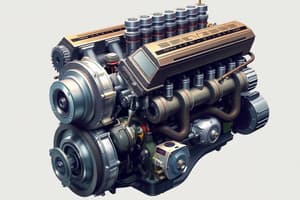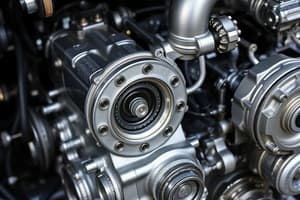Podcast
Questions and Answers
What is the primary function of the cylinder head in an engine?
What is the primary function of the cylinder head in an engine?
- To provide a cooling pathway for engine fluids
- To support the crankshaft and camshaft
- To seal the combustion chamber and house the valves (correct)
- To regulate the air-fuel mixture entering the combustion chamber
Why is it important to remove cylinder head bolts in a specific sequence?
Why is it important to remove cylinder head bolts in a specific sequence?
- To prevent cracking of the cylinder head during removal (correct)
- To minimize the risk of damaging the gasket upon removal
- To ensure an even distribution of torque during tightening
- To avoid misalignment of the engine components
What does 'Top Dead Center' (TDC) refer to in relation to piston position?
What does 'Top Dead Center' (TDC) refer to in relation to piston position?
- The position where the piston is in neutral position
- The position where the piston is at its highest point in the cylinder (correct)
- The position where the piston is halfway up the cylinder
- The position where the piston is lowest in the cylinder
What should be inspected on the piston during disassembly?
What should be inspected on the piston during disassembly?
Why is it important to inspect cylinder walls for scoring or glazing?
Why is it important to inspect cylinder walls for scoring or glazing?
What role does the crankshaft play in the engine's function?
What role does the crankshaft play in the engine's function?
What should be checked on the crankshaft to ensure it is in good condition?
What should be checked on the crankshaft to ensure it is in good condition?
Why is a valve spring compressor necessary during valve removal?
Why is a valve spring compressor necessary during valve removal?
What is the first step in the engine disassembly process?
What is the first step in the engine disassembly process?
What tool is recommended for holding the flywheel still during its removal?
What tool is recommended for holding the flywheel still during its removal?
Which component is NOT removed along with the external attachments during the disassembly?
Which component is NOT removed along with the external attachments during the disassembly?
What is the primary function of the spark plug?
What is the primary function of the spark plug?
Why is it important to document the orientation of parts during disassembly?
Why is it important to document the orientation of parts during disassembly?
What should be done if fasteners are missing during disassembly?
What should be done if fasteners are missing during disassembly?
What is the main purpose of the air filter in an engine?
What is the main purpose of the air filter in an engine?
Which of the following is a role of the spark plug wire?
Which of the following is a role of the spark plug wire?
Flashcards are hidden until you start studying
Study Notes
Disassembly Process Overview
- Begin by removing the pull starter and labeling fasteners in a Ziplock bag for organization.
- Use a Briggs and Stratton flywheel strap wrench; one partner holds the flywheel while the other removes the flywheel nut with a socket and ratchet.
- Carefully extract the flywheel from the driveshaft after nut removal.
External Components Removal
- Air Filter: Prevents dirt and debris from entering the engine, ensuring clean combustion.
- Carburetor: Mixes air and fuel for optimal combustion; crucial for engine performance.
- Exhaust System: Directs exhaust gases away from the engine; helps reduce emissions and noise.
Spark Plug and Wire Functions
- Spark Plug: Ignites the air-fuel mixture in the combustion chamber; essential for engine operation.
- Spark Plug Wire: Transmits electrical current from the ignition system to the spark plug; vital for spark generation.
Documentation of Parts Orientation
- Important to document the orientation of parts to facilitate proper reassembly and avoid errors.
- To assess spark plug condition, check for wear, deposits, and carbon buildup indicating engine health.
Cylinder Head Removal
- Cylinder Head: Houses the combustion chamber and houses valves; critical for engine compression and performance.
- Gasket: Seals the cylinder head to prevent leaks; improper sealing can lead to engine failure.
- Remove cylinder head bolts in a specific sequence to prevent warping and ensure even pressure distribution.
Piston and Connecting Rod Disassembly
- Top Dead Center (TDC): Position of the piston at the highest point in the cylinder; critical for timing and measuring.
- Inspect piston for wear, cracks, and scoring while removing to ensure functionality.
- Handle piston and connecting rod carefully to avoid damaging components.
Crankcase Disassembly
- Crankshaft: Converts linear piston motion into rotational power; essential for power delivery.
- Camshaft: Controls valve timing; critical for the intake and exhaust cycle.
- Improper crankshaft removal can misalign components during reassembly.
- Inspect bearings to ensure smooth operation and prevent engine failure.
Valve Train Disassembly
- Valves: Control the flow of air and fuel into the combustion chamber and exhaust out; essential for engine efficiency.
- Valve Spring Compressor: Necessary tool for safely removing valves without damage.
- Look for signs of wear on valves and valve seats, such as pitting or warping, indicating potential issues.
Inspection of Engine Components
- Piston and Rings: Check for scoring or cracks; measure diameter with calipers to ensure it is within specifications.
- Assess piston usability based on wear patterns and structural integrity.
- Cylinder Walls: Inspect for scoring or glazing; measure bore size with a micrometer.
- Determine if honing or replacement is necessary based on wear measurements.
- Crankshaft: Look for wear, scoring, and cracks; measure journal diameters for adherence to tolerance levels.
Studying That Suits You
Use AI to generate personalized quizzes and flashcards to suit your learning preferences.




